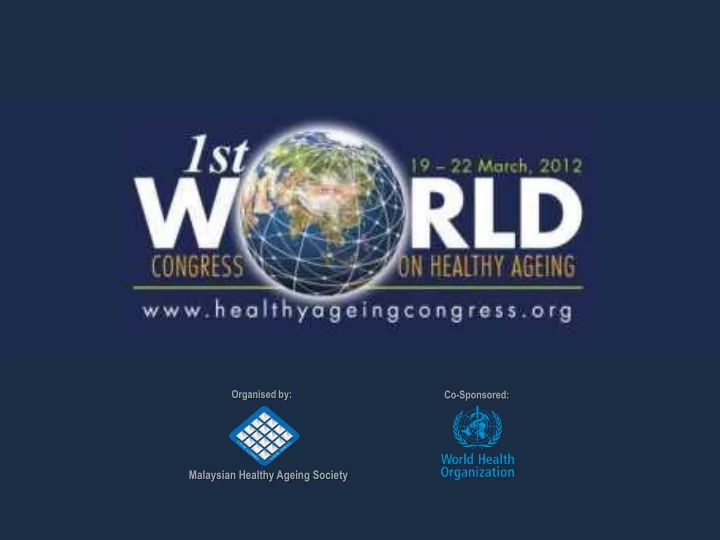

Organised by: Co-Sponsored: Malaysian Healthy Ageing Society
1th WORLD CONGRESS ON HEALTHY AGEING 2012, 絆 kizuna, 19 th -22 nd March, Kuala Lumpur JAPAN MEDICAL SOCIAL WORKERS’ SU SUPP PPORTS TS OF F HO HOME E CA CARE RE FOR FO TE TERMINAL AL DEM EMEN ENTI TIA A PA PATI TIEN ENTS TS AN AND FA FAMILIES ES Hospital, National Center for Geriatrics and Gerontology The Center for Comprehensive Care and Research on Memory Disorders Aya Seike Akimasa Takeda, Takashi Sakurai, Yukihiko Washimi, Hidetoshi Endo, Kenji Toba Hospital, National Center for Geriatrics and Gerontology, JAPAN
Out line - Today’s presentation has 5 parts- 1: Background & Objects 2: Methods 3: Results 4 : Summary 5 : Conclusion
Operational definition Terminal Dementia Patients -The tentative plan(Aida,Shimizu,2010)- 【 State 】 ・ Dementia advances. Communication, Ingestion, Swallowing are difficult. Bedridden state. ・ The doctors can’t expect the uptrend of disease condition, prevention of advance. (If they provide with the possible best medical treatment) ・ Performing clinical decision. (With the consideration of the dying process)
Operational definition ※ Medical Social Worker (Suzurikawa,2002; Seike,2011) ( ※ an abbreviation: MSW) ・ They solve bio-psycho-social problems of patients with physical disease and mental disorder by using their knowledge and skills in social welfare. ・ They coordinate teams which support patients and their families so that other medical ,health-care, and welfare staffs can cooperate smoothly.
Background Various problems of terminal dementia patients and their families Research on Japanese National Government Supports for Japanese terminal dementia policies in JAPAN terminal dementia patients patients No systems support Dementia Few research on patients who don’t how welfare staff can refugees know their rights and support patients and with no place for the means to apply families. recuperation for formal supports.
Objects How can MSWS support home care and life styles of terminal dementia patients and their families ?
Research methods A home health provider’s two MSWs took charge of pts& families 【 period 】 May2009 – May 2011 【 come from 】 discharged from the critical care & mental hospitals, the long-term care health facilities 【 total number 】 450 patients From among Subjects: Terminal dementia patients at home (N=45) and Their families(N=55) Main data: 1: Pts’ mental & physical states, the kinds of medical treatments & care supports 2:Their families’ needs 3:MSWs’ supports Extraction of data: From their case records, clinical records Analysis: Statistical analysis
Results1 - Patients’ attributes of the point that MSW began intervention - (N=45) Items of assessments Score, The number of people(%) 80.5 ± 4.25(years) The average age(SD) 7.5 ± 3.2 ※ full marks=30 Mental : Mini-Mental-State 【 MMSE 】 (SD) Physical(ADL): Barthel Index 【 BI 】 (SD) 15.2 ± 5.3 ※ full marks=100 Cerebro vascular disease 18(40.0%) Major diseases(Except for dementia) Cardiac disease 12(26.6%) Cancer 8(17.7%) The doctor’s home visiting 42(93.3%) The style of receiving medical support The condition of house hold Elderly couple 27(60.0%) With one child 13(28.9%) Non-utilization 19(42.2%) (though application of formal supports are necessary) ※ Only family care 12 Using a daily help 3 Friend’s support 2 Volunteer’s support 2
Results 2 - The total number of families’ primary needs - (The number of families=55 people) 33(60.0%) Listening of their thought 28(51.0%) Requests of some informations and advices about social services utilization 15(27.3%) Explanation of pts' conditions and prognosises (the number of people) 0 10 20 30 40
Results 3 -Details of supports to their families- (The total number of the supports, n=368 cases) (The total number of families , N=55 people) 201(54.6%) Understanding of their emotions and efforts 183(49.7%) Checking of their intentions (life design, plan of care) Advice on how to utilize social support 162(44.0%) 130(35.3%) Explanation of social support system 102(27.7%) Reports on the progress of their supports 83(22.6%) Companionship (when their doctors will tell pts' (the number of case) prognosis to their families) 0 50 100 150 200 250
Results 4 -Details of supports to patients- (The total number of patients , N=45 people) Two supports to their families ・ Understanding of their emotions and efforts ・ Checking of their intentions at the same time MSWs’ hearings of patients’ life history and thinking, memories with patients. The patients’ supports = The indirect supports The creations of the base for the best choices to patients
Summary 1: Patients’ attribute of MSWs’ first intervention They had high risk factors of life difficulties. ・ The patients’ disabilities of judgment ⇒ The necessity for the substitute determination by their families for patients’ life style, medical and care supports ・ House hold (elderly couple) ・ Non-utilization of formal supports 2: The families’ primary needs ・ Listening of their thoughts ・ ”The patients’ life in the future” ( e.g.; Advices about social services utilization Explanation of patients’ prognosisses)
Summary 3. MSWs’ support for their families ・ Understanding and checking of their thoughts, emotional. ・ Explanation and advice to utilize social supports Predominated by “Encouragement” and “ Education” . At the same time 4. MSWs’ support for the patients ・ The indirect supports MSWs’ hearings of patients’ life history and thinking, memories with patients. The creations of the base for the best choices to patients and families
Conclusions -What are the creations of the base for the best choices to patients?- autonomy Autonomy Self- determination The prevention of abuse & neglect Patients, Families The practices of MSWs’ supports “Education” “Encouragement”
To everyone attending We will do our best. We never give up, even if what happens. 絆 kizuna, JAPAN Please share with me your research and practice in supporting patients and their families. Thank you very much. I’m looking forward to seeing you! - Arigato, Xie Xie, Danke, Merci, Gracias, اًرْكُش . , ขอบคุณ , Salamat po , Terima Kashi,- Hospital, National Center for Geriatrics and Gerontology, JAPAN
Recommend
More recommend